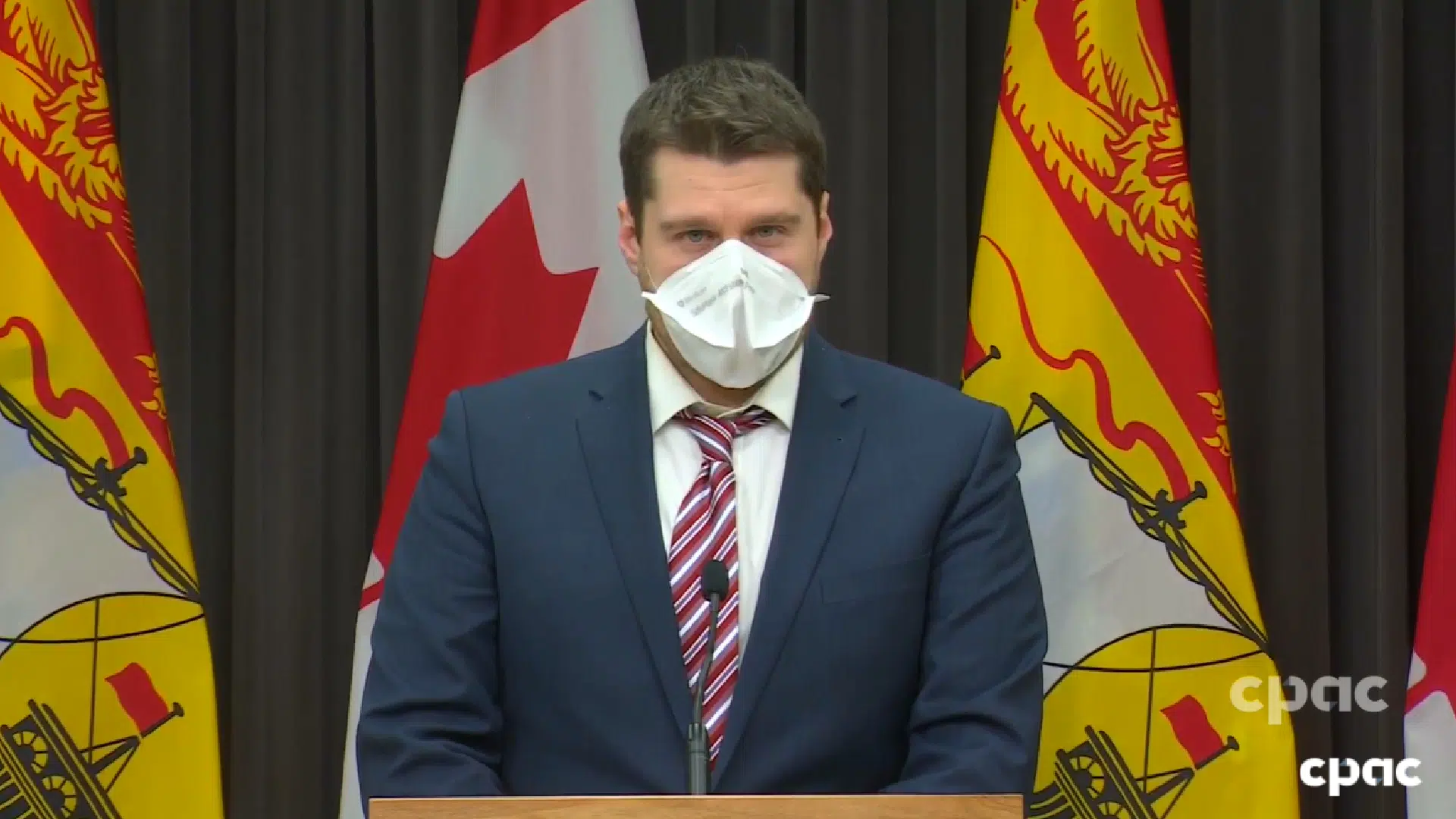
Mathieu Chalifoux, the chief epidemiologist for Public Health in New Brunswick, speaks during a briefing on Jan. 11, 2021. (Image: CPAC video capture)
Numbers released by the province predict that cases and hospitalizations from the Omicron variant will peak at the end of January, with new cases jumping as high as 5,500 per day.
Mathieu Chalifoux, New Brunswick’s chief epidemiologist, said that using modelling based on the case counts of other provinces and territories, there could be close to 5,500 new cases per day and 220 active hospitalizations in New Brunswick by late January or early February.
“The Omicron variant is highly transmissible and though milder than the Delta variant, it is by no means, mild,” said Chalifoux during a COVID-19 technical briefing on Tuesday.
“As trends decrease, we expect to be where we are today in about five to six weeks’ time.”
Chalifoux said isolation requirements along with the coming rise in cases will impact the province’s healthcare capacity — as well as other critical services such as police, fire departments and power services and businesses.
This impact is already being felt at the Saint John Regional Hospital, which is “in a crisis” and has outbreaks in six units, according to the interim president and CEO of the Horizon Health Network.
Dr. John Dornan said they are prepared to redeploy staff from nearby hospitals or others around the province, if necessary.
“Each day Horizon evaluates where we are in terms of staffing numbers, and what services we can safely deliver, and we prepare to make difficult decisions as required, which may result in Horizon focusing on life-saving care only,” said Dornan.
According to the province, there are 377 healthcare workers across who have tested positive for COVID-19 and are currently isolating.
Hospitalizations continue to rise
New Brunswick reported 88 active hospitalizations on Tuesday — a new high for the province — with 14 people in intensive care. Of those currently hospitalized, 35 contracted were admitted for other reasons and contracted COVID-19 while in the hospital.
For every 1,000 cases of the Delta variant, Chalifoux said the province would have expected 60 hospital admissions. With Omicron, the province now expects 10 admissions per 1,000.
“While better, this is still enough to put our health system at risk due to the sheer volume of cases,” said Chalifoux.
“This is above and beyond our capacity to continue testing and recording accurately. Yet we’re starting to observe this affecting our total number of hospitalizations.”
Chalifoux said the peak number of cases and hospitalizations can be reduced by one-third from the current rate if people reduce their contact with others by 10 per cent — and two-thirds if people reduce contact with others by 20 per cent more than current levels – by January 14.
“It’s everywhere in this province and we need to assume everyone we come in contact with will have it. The next few weeks will be intense but they will not last forever. We will get through this,” he said.
“The best way to prevent COVID-19 right now is to reduce your contacts. This small action will protect your family, reduce strain on the healthcare system and protect our economy.”
191 new cases, 1 additional death
Public Health said Tuesday that a person aged 90 or over in the Moncton region has died as a result of COVID-19, bringing the total number of deaths to 173.
Based on PCR testing, there were 191 new cases and 511 more recoveries reported. The number of known active cases now stands at 7,347.
The new cases include 62 in the Saint John region, 60 in the Moncton health zone, 20 in the Edmundston region, 19 in the Fredericton health zone, 17 in the Miramichi region, 10 in the Campbellton health zone, and three in the Bathurst region.
Public Health also reported that 842 new positive rapid test results had been submitted online.
“These totals are based on information received by the Department of Health from the public and are not intended to be taken as a true representation of the total number of cases in the province,” the province said in a release.






